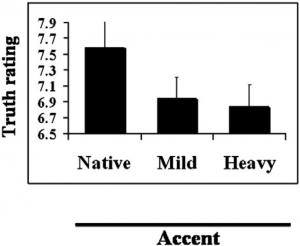
As shown in the video above, humans love to imitate accents from around the world. Studies from the University of Manchester believe that if you talked to someone in their accent, you would understand them better. Our brain is an accent discriminator and tends to doubt foreign accents.The moment we hear an accent we diagnose the person as foreign and unfamiliar.

An accent is defined as a distinctive way of pronunciation, inflections, tones and emphasis patterns. In 2010, University of Chicago psychologists Shiri Lev-Ari and Boaz Keysar studied how the brain processes non-native accents in a report entitled ” Why don’t we believe non-native speakers?:The influence of accent on credibility”. This would prove that our brain doubts foreign accents therefore the credibility of one’s words is lost behind one’s accent. People were asked to judge the truthfulness of trivia statements received from either native and non native English speakers. Lev-Ari and Keysar hypothesized that if the subject found the statement less believable when the messenger had an accent then credibility was associated to the ease of processing the speech known as cognitive fluency.
In the second part of the experiment, Lev-Ari and Keysar tested if the doubt would be observed if subjects were aware that they were doubting foreign
accents. Therefore, this time, the psychologists informed the participants about the purpose of their study on cognitive fluency and credibility. Nonetheless, the same conclusions were observed in which statements were less believed when the messenger had a heavy accent. The psychologists suggested that instead of perceiving their speech as harder to understand, it was thought as less truthful.
This research was then compared to the University of Michigan ‘s study on the impact of a decreased font size when asking subjects : “How many animals of each kind did Moses take on the Ark?” [Answer: None – Moses wasn’t on the Ark, Noah was]. Font size like accents decreases cognitive fluency.Researchers now go on to say that one should practice analyzing small fonts more carefully and do likewise with non-native accents.
However, Pavel Trofimovich, applied linguist at Concordia University, believes that one should listen beyond the accent and judge credibility with grammar and vocabulary, hence, comprehensibility. Similarly, his British colleague, Talia Isaacs highlights the importance of identifying aspects of speech that don’t actually affects listener’s understanding but enhance stereotypes. Upon researching about accents, it is easy to come across these stereotypes with imitations.
Ultimately , we should be aware of both accents and comprehensibility.Imitation may help to adapt to one’s accent. However, there is a risk of falling into offensive stereotypes . Similarly, one must be aware and parse the brain’s discrimination towards unfamiliar and foreign accents. Therefore, refocus on judging the messenger’s credibility with both their actions and words not just their accents.
– Diane Mutabaruka




2 responses to “The OTHER Foreign Accent Syndrome : I do not understand nor believe you !”